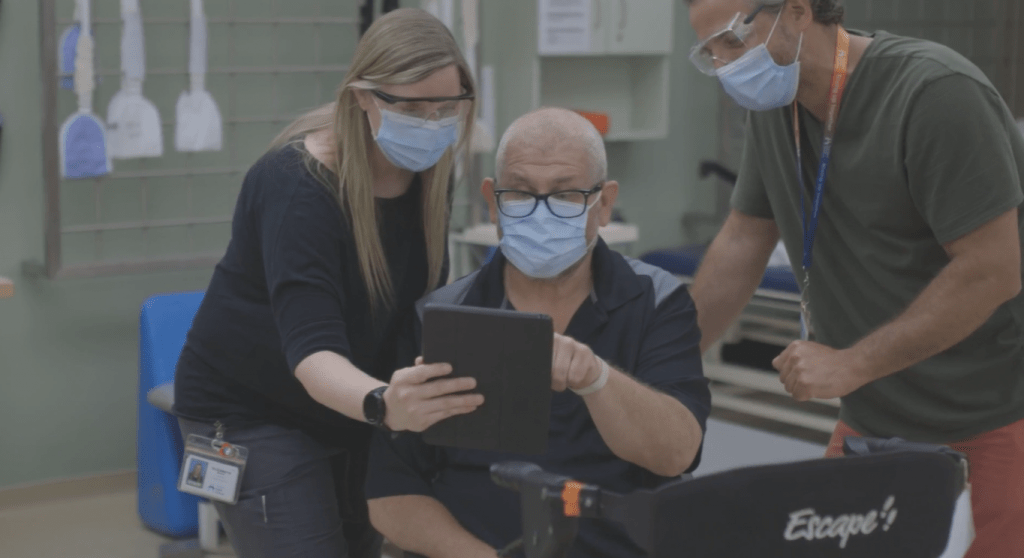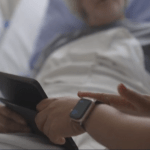
4 ways our new hospital information system will improve patient safety and care
A new electronic hospital information system (HIS) called Epic is coming to Hamilton Health Sciences (HHS) in June 2022. The implementation of Epic is a landmark clinical transformation and one of the biggest changes to operations in HHS history.
Epic’s digital tools will help health care providers and staff manage workloads and patient data, and make better informed decisions in real time. For patients, this means safer and more seamless care.
Here are four ways Epic will help improve patient safety and care at HHS.
Staff and providers will have a full picture of a patient’s medical history

With Epic, health care providers will understand where a patient has been, and where they’re going in their care journey.
HHS’ current hospital information system is comprised of multiple systems, all containing different parts of a patient’s record. One of the biggest advantages of Epic is its promise of “one patient, one record”, which means that, no matter where a patient is in the hospital, staff and providers will be able to view their full medical history in one unified system. Patients will also be able to update parts of their health record on their own (like medications and allergies) using an app called MyChart.
With Epic, patients won’t have to worry about remembering every detail of their medical history, and providers and staff will be able to make more informed decisions about their care. Using one system across HHS will also dramatically reduce the amount of time providers and staff spend searching for information, enabling them to spend more time listening to patients’ concerns and providing care.
No more deciphering handwriting
Medical professionals are notorious for having hard-to-read handwriting, which can infrequently lead to misunderstandings and errors. For example, misreading a note in a patient’s chart might lead to a wrong dosage of medication.
With Epic, staff and providers will use mobile phones, tables and workstations-on-wheels to update patient information electronically, significantly reducing the chance for errors and patient harm.
Improved communication between care providers inside and outside HHS
A challenge for many patients occurs when they leave the hospital and return to their primary care physician or another external health care provider for care. External providers often need access to a patient’s record to continue providing care, and requesting this information from the hospital can cause unnecessary delays or put pressure on the patient to keep track of everything on their own.
An application called EpicCare Link will make it possible for select external organizations to securely access a patient’s chart, schedule appointments, place orders, communicate with the patient’s hospital care team, and more. This will enable better communication and more effective collaboration between care teams within and outside HHS, improving the patient experience overall.
More support for patients at home
Over the course of the pandemic, virtual care – including medical appointments by phone or video conferencing – increased by 1,500 per cent at HHS, and it’s unlikely that demand will decrease in the future. Virtual care offers a convenient, accessible alternative for appointments that do not require patients to visit the hospital, and it will be part of HHS’ Epic system.
Staying connected to patients using Epic’s virtual care tools has been shown to reduce unplanned emergency department visits and admissions because providers and staff can proactively monitor patients’ symptoms, medications and progress remotely, and check in using secure messaging and video calls. Post go-live, HHS will explore additional features within MyChart that patients can use to send messages and photos to their care team when they have questions or concerns.

Filomena Canci is part of the team bringing Epic to HHS.
“Our Vision is to provide ‘Best Care for All’,” says Filomena Canci, HHS’ chief nursing information officer and one of the leaders working to bring Epic to the hospital. “Not only will Epic improve clinical care delivery and enhance patient experience, it will also help us innovate and remain at the forefront of health care in Canada.”
Work is well underway to transform HHS into an Epic hospital in June 2022, and providers, staff and patients all have a role to play.



